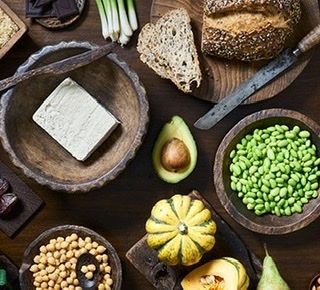Vegan lifestyle choices




Vegan diets are growing in popularity, we explore 3 health benefits that may be achieved if you follow an appropriately planned vegan diet
Whether you’re a long-term vegan or just starting out, obtaining a balanced vegan diet is achievable with the right planning and a little know-how. An appropriately planned vegan diet may offer a number of health benefits but make sure you include key nutrients such as vitamins B12 and D, the bone-building mineral calcium, as well as iron, zinc and long chain omega-3 fatty acids.
Wholefood vegan diets, which include fortified foods, are associated with better health because they are high in dietary fibre, include a plentiful supply of food sources rich in floate, vitamins C and E and the minerals, potassium and magnesium. The high fruit and veg intake, low levels of sodium (salt) and saturated fat all mean vegan diets tend to score highly in the healthy stakes.
Here are three health benefits of a vegan diet:

For some, the incentive to potentially lose a few pounds is motivation enough to turn to a plant-based diet. A greater fibre intake means meals are more satiating, making you less likely to snack and potentially better connects you with your hunger signals.
Studies support the fact that, in general, vegans tend to be trimmer and have a lower Body Mass Index (BMI). An added benefit is that a vegan diet is naturally lower in calories making calorie counting and portion control unnecessary.

Enjoying a diet packed with vegan-friendly foods such as wholegrains, legumes, fruit and vegetables is associated with a lower risk of heart disease including strokes.
Of particular note is the fact that male vegans appear to enjoy even greater heart benefits than females, with notable reductions in cardiac risk factors such as blood pressure and cholesterol management.

Following a wholefood vegan diet may help those with blood sugar disturbances. People who adopt a vegan diet tend to have higher insulin sensitivity and lower blood sugar levels and as a result a reduced risk of developing type 2 diabetes.
This is, in part, down to the fact that, by its very nature, a wholefood vegan diet tends to supply plenty of lower Glycaemic Index (GI) foods which are rich in dietary fibre. Including wholegrains in the diet helps stabilise blood sugar because the wholegrain helps slow digestion, acting as a physical barrier.
On the other hand, refined grains (typically white versions of bread, pasta, rice) and even ‘wholemeal’ products, have been ground or processed, which makes digestion faster and the release of their carb content more rapid. If you want to achieve the blood sugar benefits of a vegan diet, ensure you include plenty of wholegrains in your meals.